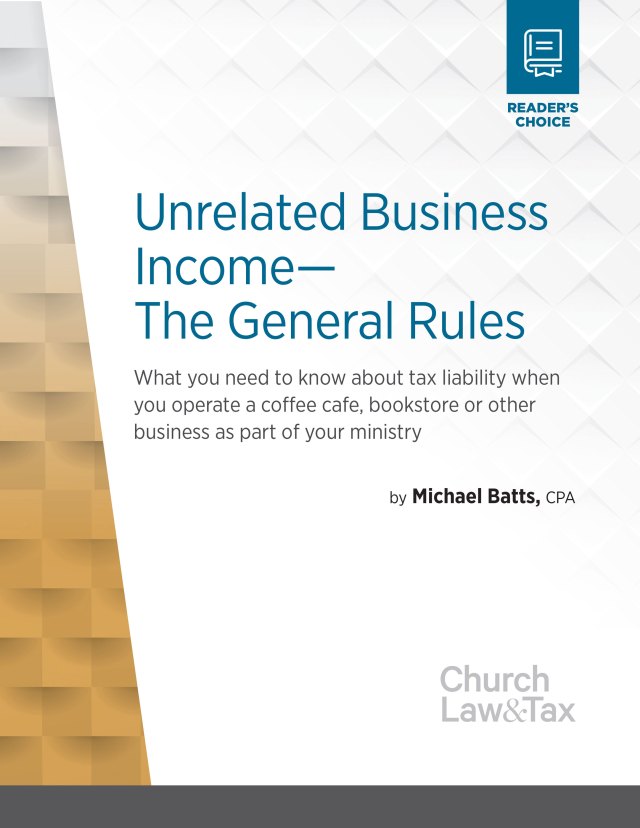Churches and religious organizations often engage in revenue-generating activities for two main reasons. Some activities begin as ministries designed to serve the community, incidentally generating nonessential cash flow. Others, however, rely on cash flow to ensure their success. Navigating these distinctions is critical when understanding the commerciality doctrine and how it applies to tax-exempt organizations.
The IRS has intensified its focus on the business operations of tax-exempt organizations to determine whether these activities align with the organization’s mission or function more like standalone businesses subject to taxation. The commerciality doctrine plays a pivotal role in this determination, influencing how churches can manage their revenue-generating operations while retaining their tax-exempt status.
What Is the Commerciality Doctrine?
The IRS permits nonrelated business income, but income—distinct from donations—is taxable if it arises from activities not “substantially related” to the organization’s exempt purpose. According to IRS regulations, “substantially related” means the trade or business must “contribute importantly to the accomplishment of the exempt purpose of an organization.”
To assess whether activities are taxable, the IRS applies these three standards:
- The activity is not substantially related to the organization’s exempt purpose or function.
- The activity qualifies as a trade or business.
- The activity is regularly carried on.
Additionally, income exceeding $1,000 in a fiscal year requires filing Form 990-T. For detailed instructions on filing, visit the IRS instructions for Form 990-T.
Examples of Revenue-Generating Activities
Churches frequently face scenarios where the commerciality doctrine may apply. Here are some examples:
1. Bookstore Ministry
A church opens a small bookstore inside its facility to provide members with study guides and resources. The bookstore operates primarily during church activities and sells items at a profit. Because this activity supports the church’s educational mission, the income is not taxable.
2. Bookstore Business
If the bookstore grows to include a wide array of products, establishes regular hours, and moves to a location accessible to the public, it may no longer be considered part of the church’s mission. In such cases, the income is likely taxable.
3. Newsletter with Ads
A church publishes a newsletter as an evangelistic tool and sells advertising to cover costs. If ad sales generate a profit, that income could be taxable, particularly if it competes with for-profit businesses for the same advertising dollars.
4. Parking Lot Leasing
A downtown church leases its unused parking spaces to nearby businesses during the week. Since leasing space is unrelated to the church’s mission, the income would typically be taxable under the commerciality doctrine.
Steps to Help Avoid an IRS Audit
Church leaders can take proactive steps to minimize the risk of IRS audits and ensure compliance:
1. Clarify Your Mission
A clear mission statement helps determine whether an activity aligns with the church’s purpose. Use it as a guide for decisions regarding revenue-generating activities.
2. Separate Ministry from Business
When a ministry begins to resemble a business, consider incorporating it separately. This is particularly important if the activity accounts for 50 to 80 percent of the church’s income or poses significant liability risks.
3. Use Property Wisely
Be cautious with rental income, particularly when using property for non-ministry purposes. Ensure any plans align with the church’s long-term goals and minimize delays for projects involving donated land.
4. Retain a Skilled Attorney
Consult an attorney experienced in church operations. They can help structure activities to meet exempt purposes and avoid unnecessary tax liabilities. As attorney Chip Watkins advises, focusing on discipleship rather than profit should remain the priority.
FAQs: Commerciality Doctrine for Churches
1. What is the commerciality doctrine?
The commerciality doctrine assesses whether revenue-generating activities of tax-exempt organizations align with their exempt purposes or function as taxable businesses.
2. What triggers unrelated business income tax (UBIT)?
UBIT applies to income from activities not substantially related to a church’s mission, particularly if those activities are regularly carried on and generate over $1,000 annually.
3. Can a church lease property without paying taxes?
It depends on the property’s use. Leasing unrelated to ministry purposes typically results in taxable income under the commerciality doctrine.
4. How can churches avoid tax liabilities?
Churches should clarify their mission, separate ministry from business activities, consult attorneys, and ensure property use aligns with their exempt purpose.
By understanding the commerciality doctrine and adhering to IRS regulations, churches can navigate the complexities of revenue-generating activities while maintaining their tax-exempt status.


